Are you considering getting a Boxer breed dog as your next pet? Boxers are a popular breed known for their loyalty, energy, and playful nature. They are also great with children and make excellent family pets. However, before making the decision to bring a Boxer into your home, it’s important to understand their unique characteristics and needs. In this article, we will explore the Boxer breed and what you should consider before bringing one home.
Breed Category: Working
Country of Origin: Germany
Average Size:57-63 cm (at the shoulder)
Average Weight:25-32 kg
Average Life Span: 10-12 years
Grooming Requirements: Moderate
Exercise Requirements:High
History and Origin
The Boxer is a breed of dog that originated in Germany in the 19th century. The breed was developed by crossing the Bullenbeisser, a now-extinct breed of dog, with the English Bulldog. The result was a powerful and agile dog that was used for hunting, guarding, and as a working dog.
The Boxer was first introduced to the United States in the early 1900s and quickly gained popularity. The breed was recognized by the American Kennel Club in 1904 and has since become one of the most popular breeds in the country.
During World War I, the Boxer was used as a messenger dog, pack carrier, and guard dog. The breed’s loyalty and intelligence made it an ideal choice for military work. After the war, the Boxer became a popular family pet and was used in police work and as a guide dog for the blind.
The Boxer’s popularity continued to grow throughout the 20th century, and the breed was used in a variety of roles, including as a search and rescue dog and as a therapy dog. Today, the Boxer is still a popular breed and is known for its loyalty, intelligence, and playful nature.
The Boxer’s distinctive appearance is characterized by its short, smooth coat and muscular build. The breed typically stands between 21 and 25 inches tall and weighs between 50 and 80 pounds. Boxers are known for their expressive faces and their tendency to “box” with their front paws.
Boxers are also known for their friendly and outgoing personalities. They are loyal and affectionate with their families and are known to be good with children. However, they can be wary of strangers and may be protective of their homes and families.
In terms of health, Boxers are generally a healthy breed, but they are prone to certain health issues, including hip dysplasia, heart problems, and cancer. It is important for Boxer owners to be aware of these potential health issues and to work with their veterinarian to ensure their dog stays healthy.
In conclusion, the Boxer is a breed of dog that has a rich history and has played an important role in a variety of roles throughout the years. From its origins as a hunting and working dog to its role as a beloved family pet, the Box
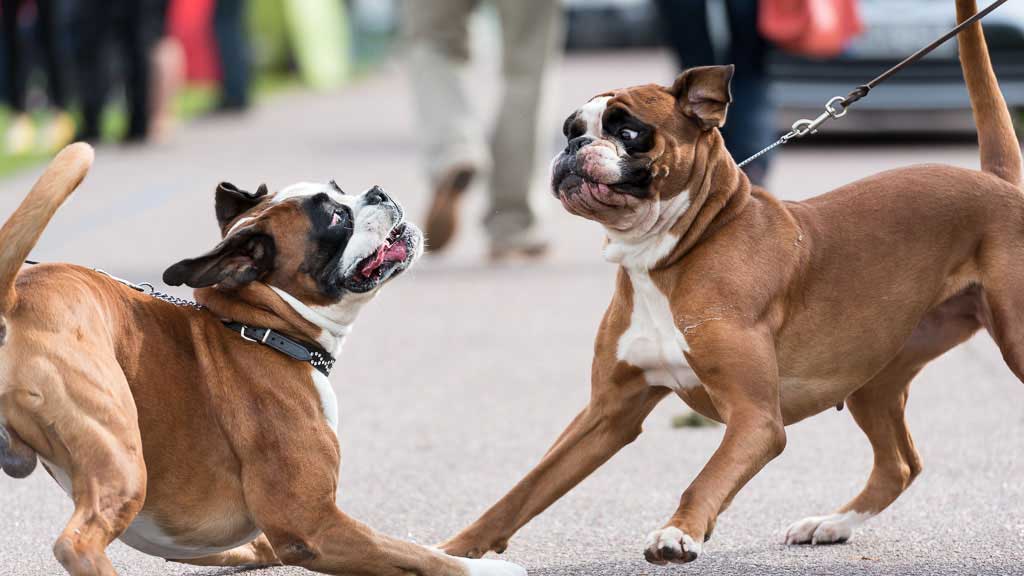
Size and Breed Category
The Boxer is a medium-sized breed of dog that originated in Germany. They are known for their muscular build and short, smooth coat that comes in a variety of colours including fawn, brindle and white. Boxers have a distinctive head shape with a broad, blunt muzzle and a strong jaw. They also have a docked tail and cropped ears, although these practices are becoming less common due to animal welfare concerns. Boxers are classified as a working breed, which means they were originally bred for tasks such as hunting, guarding and pulling carts. Today, they are often used as service dogs, police dogs and family pets.
In terms of size, Boxers typically weigh between 25-32kg and stand at around 53-63cm tall at the shoulder. They are considered a medium-sized breed, although their muscular build can make them appear larger. Boxers are also known for their high energy levels and need for regular exercise. They are a playful and affectionate breed that thrives on human companionship, but can also be stubborn and independent at times. Boxers are generally good with children and other pets, although early socialisation and training is important to ensure they develop good manners and behaviour. Overall, the Boxer is a versatile and loyal breed that makes a great addition to many households.

Fur Length and Colour
The fur of a Boxer is typically short and smooth, with a glossy appearance. The length of the fur is usually around 1-2 centimeters, and it lies close to the skin. The texture of the fur is soft to the touch, and it is not prone to matting or tangling. The Boxer’s fur is also relatively easy to maintain, requiring only occasional brushing to remove loose hairs and keep the coat looking shiny and healthy.
In terms of colour, Boxers can come in a range of shades, from fawn to brindle to black. Fawn Boxers have a light tan or beige coat, while brindle Boxers have a mix of brown and black stripes. Black Boxers are less common but can have a striking appearance with their shiny, jet-black fur. Some Boxers may also have white markings on their chest or paws, adding to their unique and individual appearance.
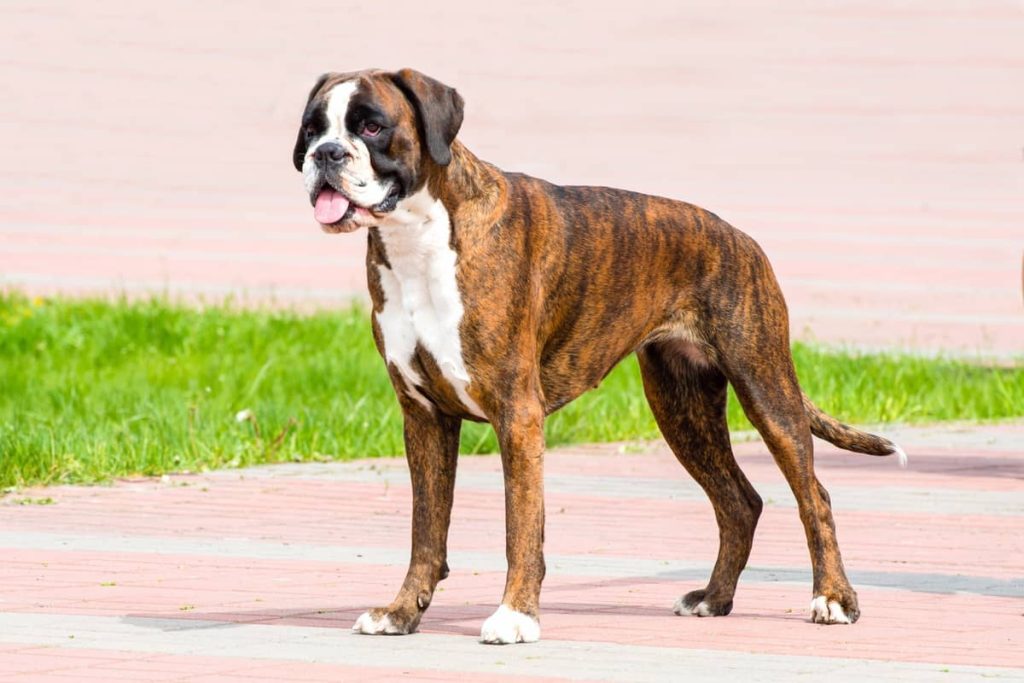
Termperament and Trainability
Boxers are known for their energetic and playful temperament. They are a breed that loves to be around people and are often described as being very loyal and affectionate. Boxers are also known for their protective nature, which makes them great watchdogs. However, they can be wary of strangers and may need to be socialized from a young age to prevent any aggressive behavior. Boxers are also known for their high energy levels and require plenty of exercise to keep them happy and healthy. They are a breed that thrives on human interaction and can become destructive if left alone for long periods of time.
Boxers are a highly trainable breed and are often used in various roles such as police dogs, search and rescue dogs, and therapy dogs. They are intelligent and eager to please, which makes them easy to train. However, they can be stubborn at times and may require a firm hand during training. Boxers respond well to positive reinforcement and enjoy learning new tricks and commands. They are also a breed that enjoys having a job to do and can become bored if not given enough mental stimulation. Overall, Boxers are a highly trainable breed that requires plenty of exercise and human interaction to thrive.
Known Health Conditions
Boxers are a breed of dog that are prone to certain health conditions. One of the most common health issues that Boxers face is heart disease. This can manifest in a number of ways, including arrhythmia, cardiomyopathy, and aortic stenosis. These conditions can cause a range of symptoms, such as lethargy, coughing, and difficulty breathing. In some cases, heart disease can be managed with medication, but in severe cases, surgery may be required. It is important for Boxer owners to be aware of the signs of heart disease and to seek veterinary care if they suspect their dog may be affected.
Another health condition that Boxers are prone to is cancer. Boxers are particularly susceptible to mast cell tumors, which can be malignant and spread to other parts of the body. Other types of cancer that Boxers may develop include lymphoma and hemangiosarcoma. Early detection is key when it comes to treating cancer in dogs, so it is important for Boxer owners to be vigilant and to bring their dog to the vet for regular check-ups. Treatment for cancer in dogs can include surgery, chemotherapy, and radiation therapy, depending on the type and stage of the cancer.

Openness to Strangers
Boxers have a reputation for being friendly and sociable with strangers. They are known to be outgoing and approachable, often seeking attention from people they don’t know. This trait makes them popular as family pets and companions, as they are always eager to meet new people and make new friends. Boxers are also known for their loyalty and protective nature, which means they will often be wary of strangers until they have been properly introduced. However, once they have been given the all-clear, they will happily welcome new people into their lives.
Boxers are also known for their playful and energetic personalities, which makes them great with children and other pets. They are often described as being “big kids” themselves, as they love to play and have fun. This trait also means that they are always up for a game or a walk, making them great exercise partners for their owners. Boxers are also known for their intelligence and trainability, which means they can be taught to be well-behaved around strangers and other animals. Overall, Boxers are a great choice for anyone looking for a friendly, outgoing, and sociable companion.
Playfulness Level
The Boxer is a highly energetic and playful dog breed that loves to have fun. They are known for their lively and exuberant nature, and they are always up for a game or a romp in the park. Boxers are particularly fond of playing with their owners, and they thrive on human interaction and attention. They are also very social animals, and they enjoy playing with other dogs and animals. Whether it’s chasing a ball, playing tug-of-war, or simply running around, the Boxer is always ready for a good time.
Boxers are also known for their mischievous streak, and they love to play practical jokes on their owners. They are highly intelligent dogs, and they are quick to learn new tricks and games. Boxers are also very loyal and affectionate, and they love nothing more than spending time with their owners. They are great family pets, and they are particularly good with children. Boxers are also very protective of their owners, and they will go to great lengths to defend them if they feel that they are in danger. Overall, the Boxer is a fun-loving and playful dog that brings a lot of joy and happiness to its owners.
Suitability as a Pet for Children
Boxers have a friendly and playful nature, making them a great choice as a pet for children. They are known for their loyalty and protective instincts, which can make them excellent watchdogs. Boxers are also highly energetic and require regular exercise, which can be a great way for children to stay active and engaged with their pet. Additionally, their short coat makes them easy to groom and maintain. However, due to their size and strength, it is important for children to be supervised when interacting with Boxers to ensure everyone’s safety.

Exercise Needs
Boxers require a significant amount of exercise to maintain their physical and mental health. As a medium to large breed, they need at least 60 minutes of daily exercise, which can be broken down into two or three sessions. This exercise should be varied and include activities such as brisk walks, runs, and playtime in a secure area. Boxers also enjoy activities that challenge their minds, such as obedience training, agility, and interactive games. It is important to note that Boxers have a high energy level and can become destructive if they do not receive enough exercise and mental stimulation.
In addition to regular exercise, Boxers benefit from having a job or purpose. They are a working breed and enjoy tasks such as tracking, search and rescue, and therapy work. Providing them with a job or task can help to satisfy their natural instincts and prevent boredom. Boxers also thrive on human interaction and should not be left alone for long periods of time. They are social dogs and enjoy spending time with their family, whether it be going for a walk or simply lounging on the couch. Overall, Boxers require a significant amount of exercise and mental stimulation to maintain their physical and mental well-being.
Suitability for a Multi-Pet Family
Boxers have a reputation for being friendly and sociable with other pets. They are known to be particularly good with children and are often described as being patient and gentle. Boxers are also known for their loyalty and protective nature, which can make them excellent watchdogs. However, like all dogs, Boxers can be territorial and may become aggressive if they feel threatened or if they perceive another animal as a threat to their family. It is important to socialize Boxers from a young age and to supervise them when they are interacting with other pets.
Housing Requirements
Boxers require a spacious living environment that allows them to move around freely. They need a minimum of 30 square meters of living space, which should be well-ventilated and have plenty of natural light. The living area should be equipped with a comfortable bed, toys, and a water bowl. Boxers are active dogs and require regular exercise, so it is important to have a secure outdoor space where they can run and play. A garden or yard of at least 100 square meters is recommended, with a secure fence to prevent them from escaping. Boxers are social animals and enjoy the company of their owners, so it is important to provide them with plenty of attention and affection.
Boxers have short, smooth coats that require minimal grooming. However, they shed moderately throughout the year, so regular brushing is recommended to keep their coat healthy and shiny. Boxers are prone to certain health issues, such as hip dysplasia and heart problems, so it is important to provide them with a balanced diet and regular veterinary check-ups. Boxers are intelligent and trainable dogs, but they can be stubborn at times. Positive reinforcement training methods work best with this breed, and early socialization is important to prevent behavioral issues. Overall, Boxers make loyal and affectionate companions for those who can provide them with the care and attention they need.
Summary
Boxers make great pets for active families who enjoy spending time outdoors. They are energetic and require regular exercise, but are also loyal and affectionate companions. With proper training and socialization, Boxers can get along well with children and other pets. They have a playful and curious nature, and enjoy being part of the family. Boxers are also known for their protective instincts, making them a good choice for those looking for a watchdog. Overall, Boxers are a great choice for those who are willing to provide them with the exercise, training, and attention they need.
Boxer Dog FAQS
Boxers are intelligent and eager to please, making them relatively easy to train.
Yes, Boxers are known for being great with children.
Boxers are prone to certain health issues such as hip dysplasia, heart conditions, and cancer.
Boxers can adapt to apartment living as long as they get enough exercise.
Yes, Boxers shed moderately throughout the year.
Boxers need at least 1-2 hours of exercise per day.
Boxers should be fed 2-3 cups of high-quality dog food per day, divided into two meals.
Boxers should be brushed at least once a week and bathed every 2-3 months.
The average lifespan of a Boxer is 10-12 years.
The average weight of a Boxer is between 25-32 kg.
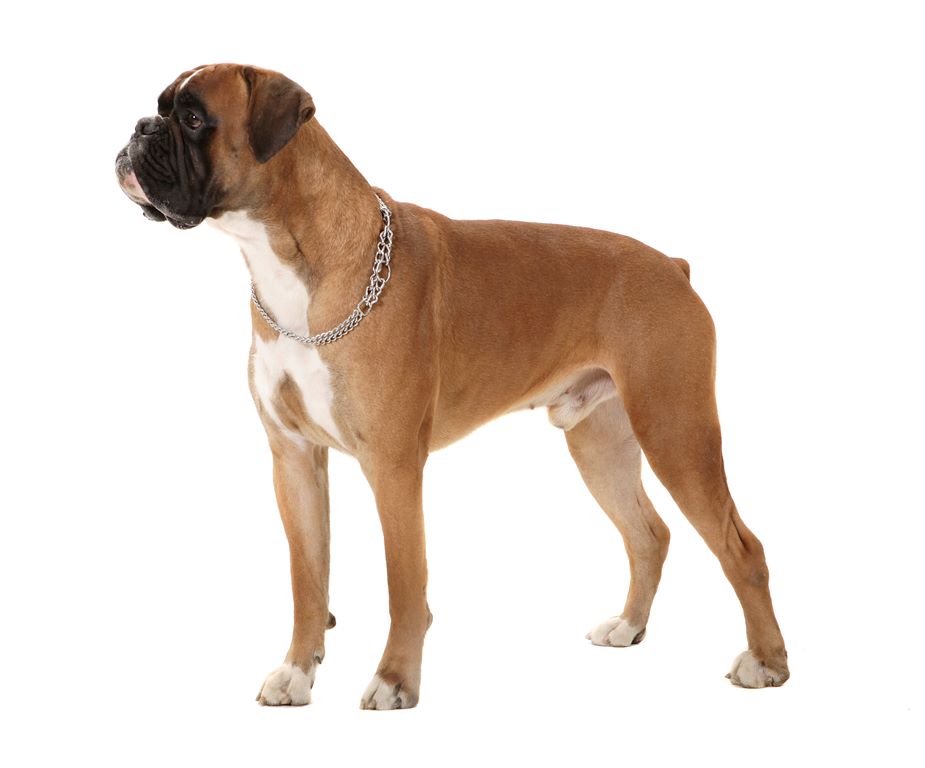

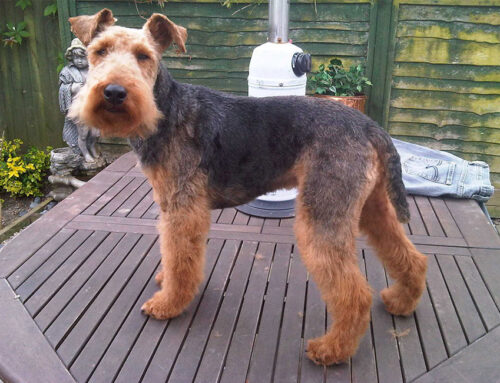

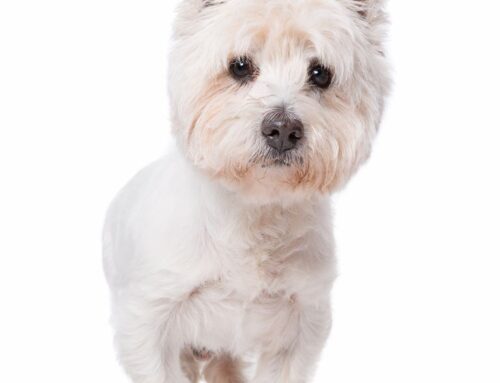
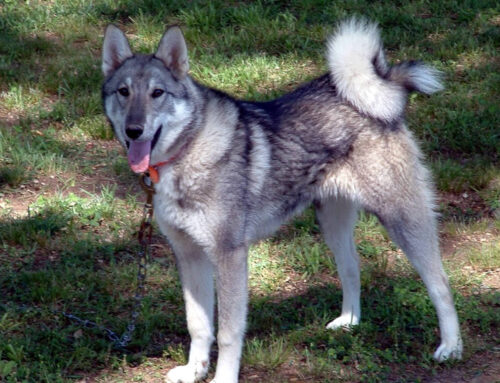
Leave A Comment